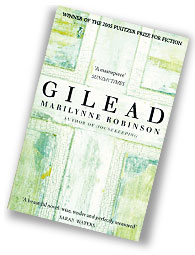FEATURE ARTICLE -
Book Reviews, Issue 34: April 2009
I am criticised at home for failing to read sufficient novels. My wife took a clever route to rectify, at least partially, this failing of mine. For my birthday occurring in October 2008, she gave me Home by Marilynne Robinson, knowing that I could hardly look askance at a birthday gift. Her cleverness did not stop there. Home is a sequel to Robinson’s 2004 book, Gilead.
I was snookered. It would be a waste if, spending valuable time reading a novel, I were to miss much of its significance by not having read the earlier book. Among the ever increasing pile of books to read (all healthy non-fiction), I was suddenly lumbered with a minimum of two novels.
So, in the aftermath of Christmas and all that socialising with family, I opened the pages of Gilead.
Gilead is a wonderful novel. “Gilead” is a word laced with biblical meaning being the name of three people and two places. It also has an underlying meaning of “hill of testimony” or “testament mount”.
In the novel, “Gilead” is the name of the small Iowa town in which most of the action takes place. However, the narrative of the novel is a form of testament.3 A seventy-nine year old Minister of religion, the Reverend John Ames, is writing a letter to his seven year old son intended to be read long after the father has died when the son has become a man.
Reverend Ames lost his first wife in childbirth and his first daughter, Angeline, shortly thereafter. For many years, he lived without romantic love. A woman, younger than his daughter would have been, had she lived, joined the congregation. Though Reverend Ames was clearly in love, it was not until the young woman told him that he should marry her that he was able to act upon this passion.
Reverend Ames writes in 1956 in the lead up to the presidential election won by Dwight Eisenhower. However, through explaining to his son what he had learned from his own father about his grandfather, who had travelled with and supported John Brown4 and Jim Lane,5 the letter writer manages to discuss the events in Iowa and Kansas as far back as during the lead up to the American Civil War.
This stratagem of discussing the lives of four generations allows the novel to range freely over small town life in the Plains West of the United States. Social and spiritual issues are visited and revisited. Themes are developed, worked and re-worked against this historical background.
As well as Reverend Ames’ immediate family, including his dead wife and child, his letter discusses the family of his life long friend Reverend Boughton who, in contrast to Ames, himself, was blessed with many children all of whom survived into adulthood.
However, particular angst surrounds Reverend Boughton’s one ne’er do well, Jack. Jack, christened John Ames Boughton after Reverend Ames, has, at the time of the letter, returned to his father’s household after a long absence. Though Jack visits the Ames’ household and makes friends with Ames’ son (the addressee of the letter which forms the novel) and wife, Reverend Ames does not rest easy. He fears that his Godson, Jack, may yet do harm to his own wife and child after he (Ames) has passed away.
The novel raises the grand themes of the meaning of love; the incongruity of the Christian concept of Hell; and the impossible dictum that we love and forgive our enemies, even when they may do harm to those who are most close to us. Despite Reverend Ames’ long hours of prayers seeking guidance and his tendency to blame his failure to find definitive answers on his own imperfections, the reader is left with the impression that there are no satisfactory answers to the really important questions.
Gilead is one of the great small novels.6 For me, it recalls both Catcher in the Rye and To Kill a Mockingbird in conveying the sense that the grand issues arise in the domestic context of the lives of ordinary people; that, while our histories may be written about generals and kings and big events, we may miss much of importance if big events and the lives of important people are all that we focus on.
As the novel moves to its conclusion, Reverend Ames finds unexpected truths in unlikely places. Even a life of contemplation and prayer can fail to tell us under which stones goodness and grace may be found.
Despite my penchant for reading non-fiction and eschewing novels, Gilead is highly recommended by this reviewer. My impressions of Home must await another day.
Stephen Keim SC
Footnotes
- Marilynne Robinson was born in 1947. her first novel, Housekeeping won the PEN/Hemingway Award for the best first novel and was nominated for the Pulitzer.
- Virago (which is the word for woman used in Latin translations of the bible) is an imprint of Time Warner Book group UK. See http://www.virago.co.uk/.
- “testament”: a formal declaration, usually in writing, of a person’s wishes as to the disposition of his property after death: Macquarie Concise, second edition.
- John Brown is probably America’s most famous domestic terrorist. His attempt to capture the armory at Harper’s Ferry in West Virginia (to start a slave rebellion) in 1859 was unsuccessful and led to his conviction for treason and death by hanging. However, his actions were influential in leading to the American Civil War which commenced 16 months later.
- James Henry Lane was the first Senator from the new State of Kansas. He led the “Jayhawkers” an anti-slavery movement in that very divided State. He was appointed a Brigadier-General of Volunteers and charged with recruitment of volunteers in the early days of the Civil War and was involved in important battles in Kansas. He died in 1866.
- Gilead won the 2005 Pulitzer Prize for fiction.



